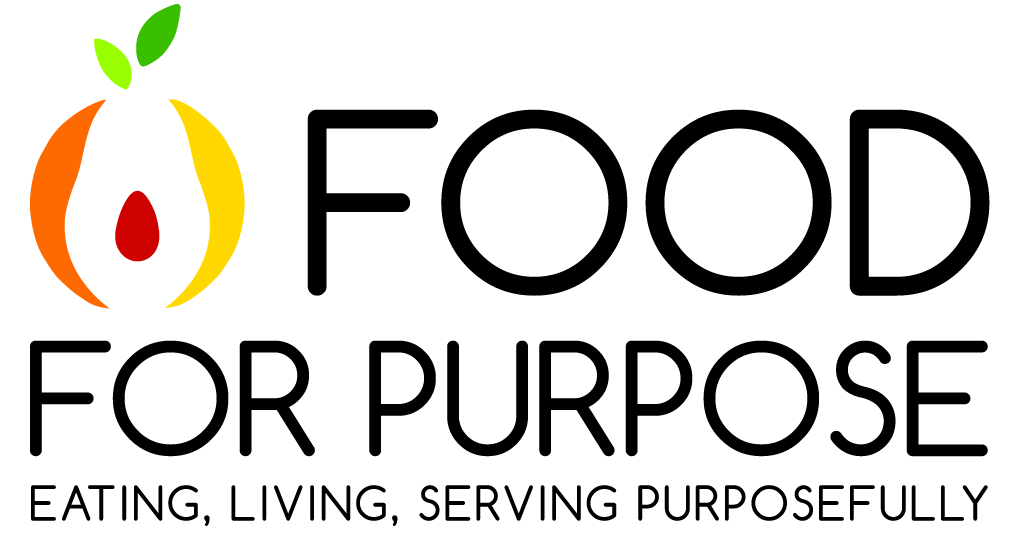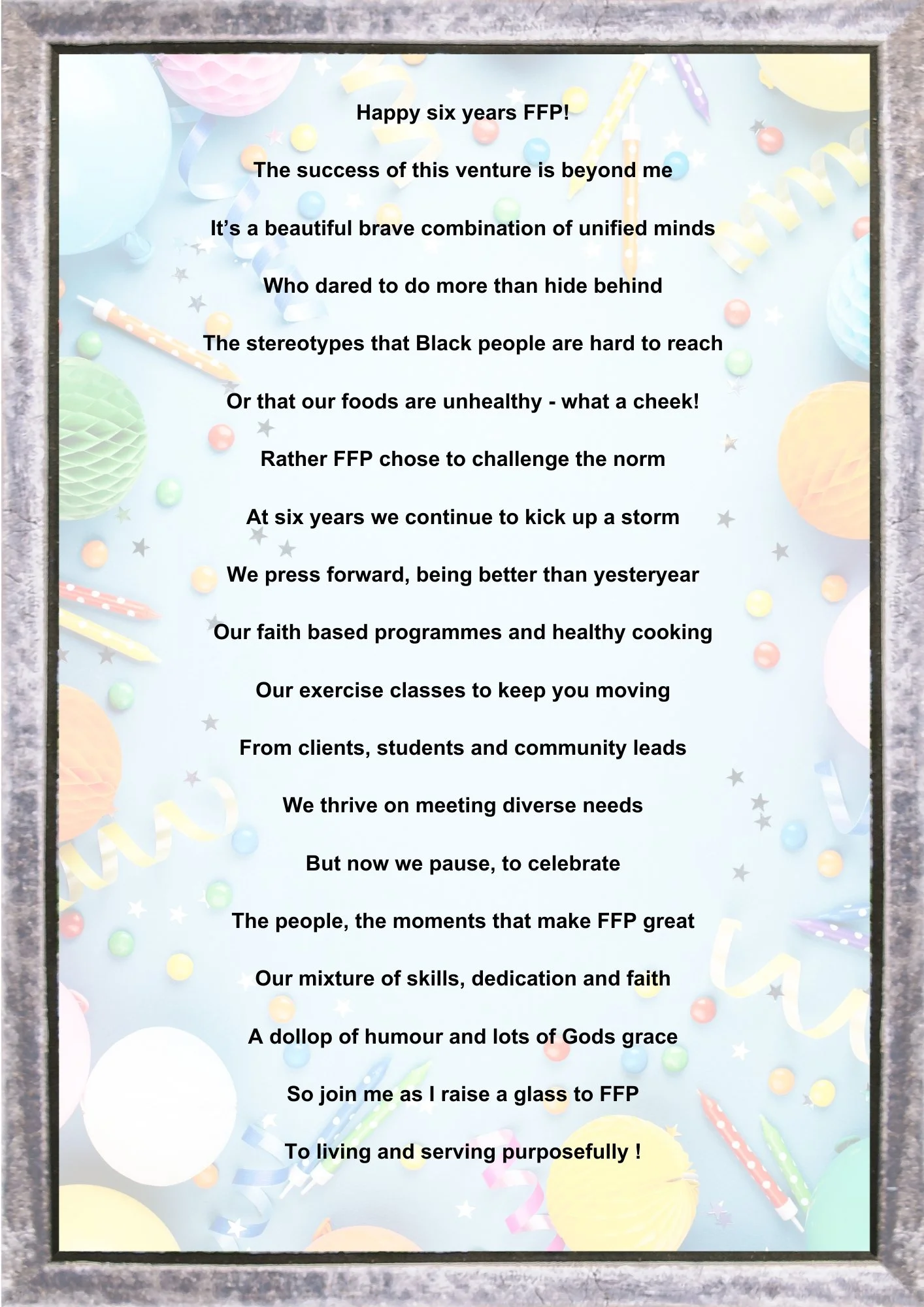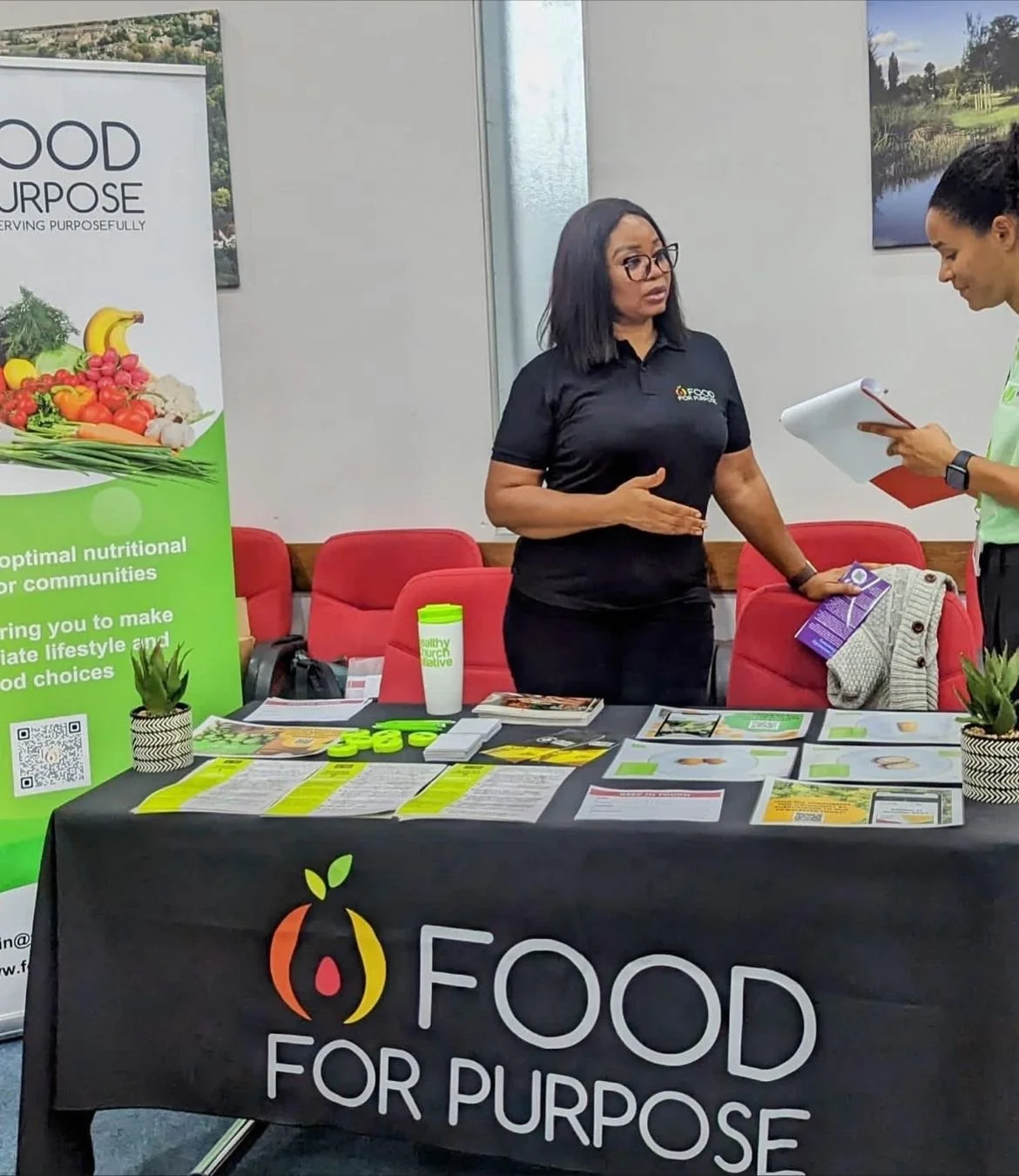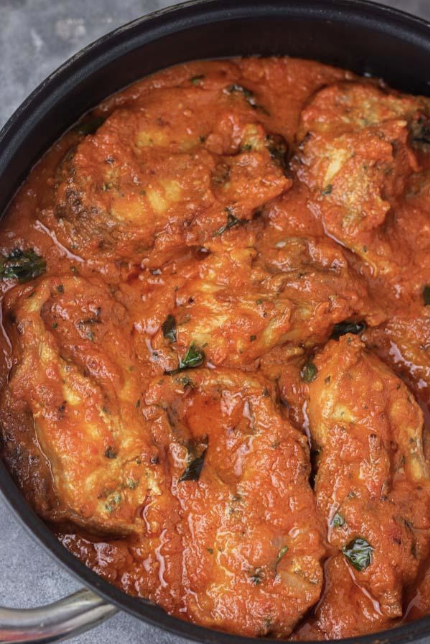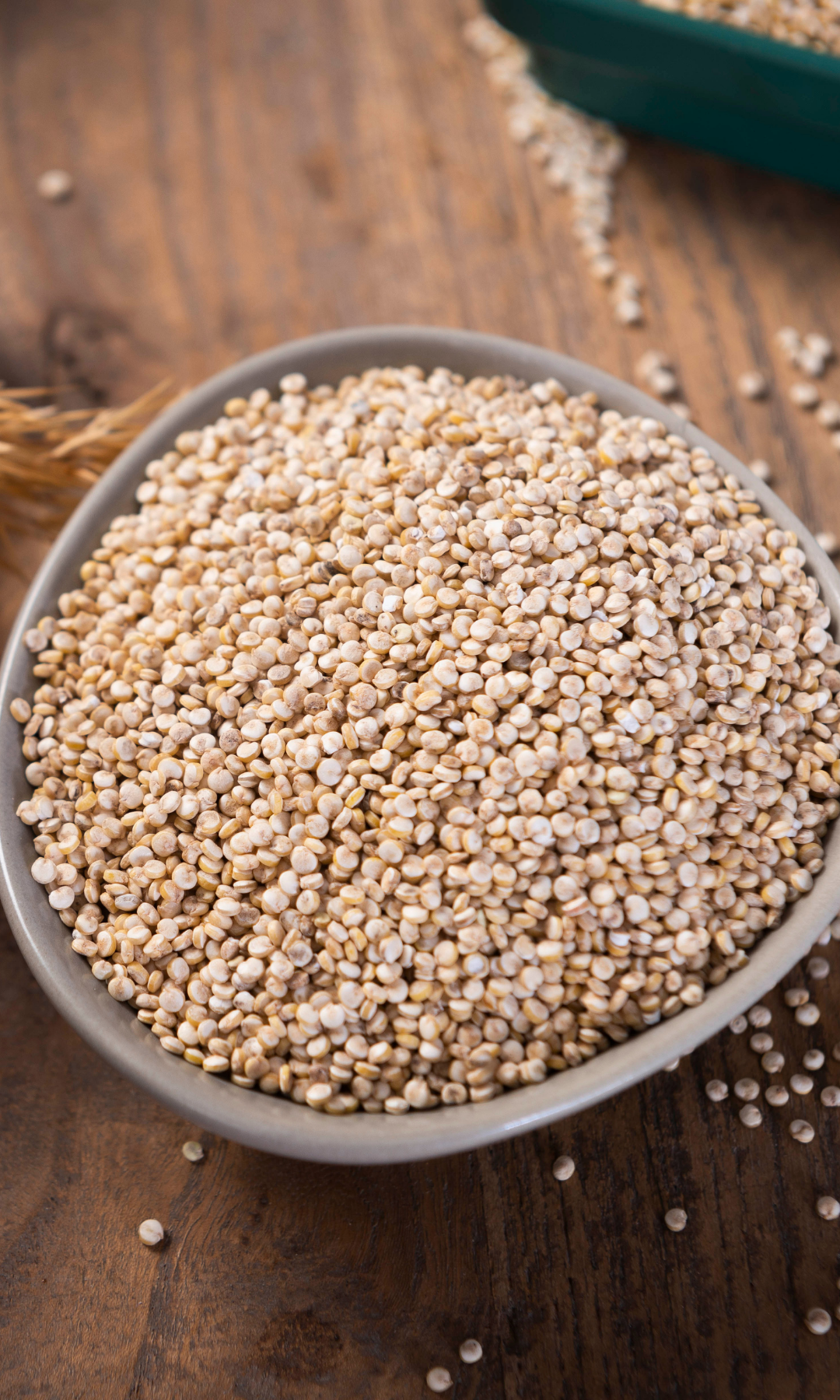🎂Edition 18🎂
🥳October 2023🥳
Let’s Celebrate 6 Years!
By Shola Oladipo, Food for Purpose CEO
Hello friends, this month is our birthday at FFP. Wooo hoooo!
The PhD is less of a focus - but will be back next month!
Six years ago I took a leap of faith, and with the support of fantastic people, six years on - we are celebrating another year of success!
November 7th 2023 marks a milestone of being better at everything we do.
I am overwhelmed with all we have achieved in the last year. We reached a notable turnover in 2023 and have big plans for the future.
I am particularly grateful for the directors and ops team who all agreed to take on additional roles to support my sabbatical. They have been amazing in punching above their weight and ensuring we win more business and maintain our current work. Our amazing volunteers and advisory team have also worked tirelessly to ensure we met our goals!
Here is a little poem I wrote to celebrate our 6th year:
Stay blessed and have a superb November!
Featured this Month
CEO Says - Let's Celebrate 6 Years!
Spotlight on Health - Breast Cancer Now, by Mishal Lalji
Recipe of the Month - Nigerian Fish Stew
A-Z of Soul Food - Okra
Exercise Expert - The Power of Functional Fitness: It’s Not Just About Looking Fit
Special Guest Contributor - Athina Inneh, FFP Volunteer & Community Health Ambassador
Food for Purpose News
Be Well Event
On Wednesday 8th November, the Food for Purpose team will be attending the ‘Be Well Event’ which takes place at the Civic Suite in Lewisham. The event will be promoting four areas of health and wellbeing: financial, physical, mental and emotional wellbeing. The FFP team will be there throughout the event so make sure to pop in and say hello! Register for your tickets below!
Lewisham Black VCS Expo
Last month, we attended the Lewisham Black VCS Expo. Meeting so many wonderful people and forging connections was a true highlight of the event. We're excited to have had the opportunity to engage with the vibrant and dynamic black organisations that make Lewisham special.
Thank you to the Lewisham Black VCS Network and Mabadiliko for having us, we look forward to the promising connections and collaborations that lie ahead.
We are hiring!
Food for Purpose is looking for a Community Dietitian or Nutritionist to join the team! We are looking for someone who is London-based and has experience working with African Caribbean communities.
If you are interested, or know someone who would be interested in this role - please contact us!
National Days / Weeks / Month - October
November 1st - World Vegan Day
November 1st-30th - Movember - Men's Health Awareness Month
November 2nd - National Stress Awareness Day
November 13th-19th - National Self Care Week
November 14th - World Diabetes Day 2023
November 19th - International Men's Day 2023
HCI News
By Gabrielle Julal, FFP Specialist Community Nutritionist
Blessings PY readers!
Has your church signed up for the Healthy Church Initiative yet? What are you waiting for?
The FFP team is continuing our endeavours in Lambeth, offering the 6-week HCI programme for free to churches in the local area. How do you know if your church is eligible to sign up? The HCI may be a good fit for your congregation if you meet the following criteria:
You’re a Black majority congregation: The HCI has been specifically designed for Black African and Caribbean faith groups. Our resources and recommendations are faith-based (not faith-based!) and culturally relevant!
You recognise the value in taking care of physical health: The Bible tells us in 1 Corinthians 3 and 6 that our bodies are temples of the Holy Spirit. While our spiritual health is of most value, if our temples are not physically healthy - how can we fulfil the great commission? Unfortunately, the Black community continues to have comparatively higher numbers of avoidable chronic illnesses. The HCI aims to help be a part of the solution.
You want to help serve your local community: At Food for Purpose, we believe that a healthy church is an asset to the community! Our team will help you achieve this and implement health-promoting activities over a 12-24 month period.
Taster sessions:
While we would love to have your church sign-up for the HCI right away, we know that this time of the year is a busy season for many churches. For churches interested in being a part of this initiative, we are also offering taster sessions to local congregations. These sessions can range from 20-45 minutes and will serve to briefly introduce the programme, resources and topics we will be covering.
If you are interested in having a taster session, learning more about the HCI or how your church can sign-up, you can find out more at https://www.foodforpurpose.org/healthy-church-initiative or get in touch by email at admin@foodforpurpose.org.
We look forward to hearing from you!
Breast Cancer Now
By Mishal Lalji, Public Health, Inclusion and Awareness Manager at Breast Cancer Now
Breast Cancer Now has developed breast awareness information aimed at women from all backgrounds
In the UK, someone is diagnosed with breast cancer every 10 minutes. Around 55,000 women and 400 men find out they have breast cancer every year, making it the most common type of cancer in the UK.
Rates of breast cancer are lower in women from ethnically diverse groups (including South Asian, black, Chinese, and mixed groups) when compared with white women.
However, when women from ethnically diverse groups do get breast cancer, they’re diagnosed at later stages and at younger ages. They have lower survival rates and poorer experiences of care and treatment than white women.
There’s evidence that black women are more likely to be diagnosed with advanced breast cancers that are harder to treat. Around 25% of black African women and 22% of black Caribbean women are first diagnosed with stage 3 or stage 4 breast cancer in England, compared with 13% of white women.
Women from these groups are also less likely to attend breast screening. This may be because of cultural and language barriers, and because there are very few interventions that are tailored specifically towards these groups.
South Asian and black women in particular report a higher level of concern about body image, and they also have stronger fatalistic beliefs. This means they’re more likely to believe that events are pre-determined and that they have no control over what happens to their health.
Studies also suggest that women with breast cancer from ethnically diverse groups have lower breast cancer awareness (like knowledge of symptoms and risk factors) than white women.
At Breast Cancer Now, we want to help empower you with knowledge about breast cancer. We’ve created resources that are accessible to people from all backgrounds, including:
Our Public Health Talk animations – available in 13 languages, including British Sign Language (BSL), this animation takes you through what breast cancer is, being breast aware, the NHS breast screening programme and risk factors
Our ethnic communities hub which highlights stories and case studies from diverse backgrounds, and has breast awareness information in a variety of different skin tones
If you've been affected by any of the topics raised in this article, or would like to ask a question, our nurses are here for you. You can speak to them by calling our free helpline on 0808 800 6000. For more information and support, visit our website breastcancernow.org/.
Nigerian Fish Stew
This simple and delicious West African dish is incredibly versatile and can be served with boiled white rice or paired with vegetable soups, accompanied with swallow. This recipe uses red bream fish, also known as red headless, but other commonly used types of fish include croaker fish, hake fish and mackerel.
Serves 6
Ingredients
1 kg red bream fish steaks
2 large red bell pepper mix:
1 can chopped tomatoes (or substitute with 6 medium Roma tomatoes)
1 Scotch bonnet chilli
2 medium onions
1 tablespoon rapeseed oil
1 tablespoon chicken bouillon powder (or substitute with any stock cube of choice)
Fish marinade
1 teaspoon garlic granules
1 teaspoon ginger powder
1 teaspoon dried parsley
1 teaspoon onion powder
Method:
Prep the fish: de-scale fish and cut into steaks, add to a bowl and rinse with water and lemon juice. Then transfer the fish to a colander to drain excess moisture.
Marinate the fish: add garlic granules, onion powder, ginger powder, parsley and 1 teaspoon of bouillon powder to the fish and mix to combine. Cover it with a cling film and marinate for at least 30 minutes. After 30 minutes, grill the fish or air fry for a total of 20 minutes, 10 minutes on each side.
While waiting for the fish to finish grilling or air frying, blend the peppers and bring to boil on medium heat for about 10 minutes.
Cook the stew: place a pan on medium heat, add oil and heat until hot. Add chopped onions and stir fry until translucent. Then carefully add the boiled pepper to the oil and bring to boil for about 10 minutes.
Season the stew with bouillon powder, stir to combine and continue to cook for another 10 minutes.
Add the grilled fish to the stew and carefully mix to combine. Shred fresh basil or scent leaves to the stew and cover the pan with its lid. Continue to cook on low heat for another 5 minutes. Take it off the heat and serve immediately.
(Recipe and above photo from:
https://www.myactivekitchen.com/nigerian-fish-stew-recipe/)
A-Z of Soul Food
This month, we’re celebrating Okra for the letter O
Okra
Okra [oh-kra], also known as bhindi or “lady’s fingers” is a flowering plant known for its edible seed pods. It is biologically classified as a fruit, but it is generally used like a vegetable in cooking. Okra comes in two colours – red and green. Both varieties taste the same, and the red one turns green when cooked.
Okra is native to Ethiopia and grows best in hot, humid climates, most commonly in Nigeria, Egypt and India. It is an essential part of African Caribbean dishes and is most often found in stews/soups, curries and gumbo. Okra has also found its place in salads, a recipe for which you can find in the June edition of the FFP Purposeful You newsletter. It is a slender, green tube-like fruit, which is why it has been nick-named lady’s fingers and contains edible white seeds which release a sticky liquid when chopped; leading okra to often be used as a thickening agent in soups and stews.
How to cook
Okra can be eaten raw, but it is most commonly cooked and is described as tasting like a mix between green beans and asparagus, but with a more earthy flavour and a distinct texture. The most common ways to cook okra is to boil it in lightly salted water or can be fried, grilled or steamed. It can be cut with ease in a variety of ways, making okra a quick dish to prepare.
The Power of Functional Fitness: It’s Not Just About Looking Fit
By Precious Oladipo, FFP Director & Fitness Lead
Functional fitness isn't just a workout routine; it's a lifestyle that empowers you to navigate life's demands with grace, strength, and agility. It's about more than just aesthetics; it's about functionality. So, what exactly is functional fitness, and why is it so essential for your daily life?
Functional fitness revolves around exercises that replicate movements and actions you use every day, improving your body's capability to perform these tasks effectively and efficiently. The exercises you perform aren't about isolating specific muscles for vanity's sake; they're about preparing your body for real-life challenges.
Imagine comfortably carrying groceries, lifting children, or bending down to tie your shoes without strain. That's what functional fitness aims to achieve – to make your daily activities smoother and safer.
Here are some examples:
Squats – they replicate the motion of sitting down and standing up. They strengthen the leg muscles, buttocks, and lower back – making it easier to rise forma chair, get in and out of a car, or pick up objects from the floor.
Lunges improve leg strength and balance. They simulate movements like climbing stairs or stepping off a curb, helping you navigate uneven terrain with greater stability.
Planks target your core muscles, including the abdominal muscles and lower back. A strong core is essential for maintaining good posture, preventing back pain, and performing daily tasks that involve lifting and carrying.
Push-ups work the chest, shoulders, triceps (back of your arms), and core. They improve upper body strength, which is valuable for activities like pushing open heavy doors, getting up from the floor, or lifting objects overhead.
Step ups Step-ups target the legs and glutes (buttocks) and mimic the action of climbing stairs. This exercise improves leg strength and stability, making it easier to ascend and descend stairs or inclines.
Deadlifts work the lower back, glutes, hamstrings (the back of your thighs), and core. They enhance your ability to lift heavy objects off the ground while maintaining proper form, which is crucial for injury prevention.
So, next time you work out, think not only about how you'll look in the mirror but how you'll conquer everyday challenges with ease. Functional fitness makes life's hurdles feel like mere speed bumps on your journey to a healthier and more capable you!
Diabetes Update
With Diabetes UK & Food for Purpose
World Diabetes Day is on 14th November and we are reminded of the thousands of people living with Diabetes across the globe. In the UK, Black African and Black Caribbean communities continue to have a higher incidence and prevalence of type 2 Diabetes than the white population, making the need for tailored, culturally relevant resources a major priority.
We are delighted to share a series of videos which were born out of a collaboration between ourselves at FFP, Diabetes UK and Diabetes Africa. The videos hone in on relevant issues facing Black people and feature straight talk about healthy eating and changing lifestyles to help control Diabetes and live healthy fulfilling lives.
Click on the thumbnails below for a video series dedicated to the Black community, featuring our CEO - Shola Oladipo, and Dr Joan St.John.
African Cuisine
#1 The little changes all add up
#3 Plan your portions
#5 Keep active too
#2 It’s the right ingredients, cooked right
#4 Stick to your plans
Caribbean Cuisine
#1 The little changes all add up
#3 Plan your portions
#5 Keep active too
#2 It’s the right ingredients, cooked right
#4 Stick to your plans
Special Guest Contributor
Athina Inneh
FFP Volunteer & Community Health Ambassador
Being part of God’s Kingdom has enabled me to keep being part of the solution in serving the community on this adventurous journey thus far. For this reason, wellness to me means empowering individuals to keep building and planting from the inside out in different spheres of health.
Health is more than the physical and how we feel. Health begins in the mind. If my mind is at peace I will eat well, exercise and make decisions that enable me to keep living a growth-developed life; which incorporates growth in my relationship with God first, then my relationship with myself and others around me. This means my thinking, my emotions and my physical state will align with my day-to-day routine. Wellness is a holistic journey that I am on each day, capturing each moment and serving the community through the different organisations God has connected me with.
Organisations such as:
Food For Purpose (FFP): Supporting and volunteering for FFP, enables me to keep encouraging individuals to eat well, and also empowering them on how to do it. This is a journey I am also on, to look after this temple (my body). 🫣
HopeUK: as a drug educator, I help young people be equipped and informed on how to make drug free choices.
A.T Beacon Project: supporting the community as a health ambassador, encouraging the community to check their blood pressure regularly.
Synergy Network: supporting the community in the area of ending Serious Youth Violence.
I am thankful to God for the opportunity to serve the community through different organisations, and also supporting as a trustee for two additional organisations AACO and Fresh Horizon CNB.
Serving the community I believe has enabled me to keep being part of the solution, a support system for those in need 🙌 It has also helped me to prioritise celebrating and capturing each moment no matter how small! 🤗
The journey thus far has also encouraged me to support young people further, as an engagement officer and a wellbeing mentor at FirstGlimpse. This is done through mentoring and coaching sessions, as well as facilitating Mental Health and Well-being workshops. The workshop sessions help to equip and empower young people in recognising the signs early and supporting themselves and others they are connected with.
Overall, my qualifications and skills are nothing compared to the exciting adventure God has invited me to be part of.🔥🙌 I am so privileged and excited as the page unfolds each day.
If needed, please feel free to get in touch for further support & questions:
Remain blessed!
Email:
📧
firstglimpse7@gmail.com
Website:
🌐
www firstglimpse.org.uk
Athina Inneh
Hey PY readers - how are you all? 🥰 We’re chuffed to bits that you’ve joined us for another full-to-the-brim edition of Purposeful You 😊
As The Resident Layperson (😂) this month, I’m exploring ‘Superfoods’ which it’s worth noting is not a term that Dietetics and Nutrition professionals officially recognise. It’s more of a clever marketing tool to promote certain foods and has no scientific basis.
Here’s the ‘Superfoods’ talk-up:
Incorporating superfoods into your diet is a key strategy for enhancing your overall well-being. These nutrient-dense powerhouses are packed with essential vitamins, minerals, and antioxidants, offering a multitude of health benefits. From boosting your immune system and supporting heart health to improving cognitive function and aiding in digestion, superfoods play a vital role in promoting vitality and longevity. By integrating these natural wonders into your meals, you not only nourish your body on a cellular level but also fortify your defenses against various diseases. Embrace the goodness of superfoods, and embark on a journey towards a healthier, more vibrant you.
Here’s the ‘Keeping it Real’ information:
The origin of the term superfood in fact appeared in the early part of the 20th Century as a strategy to market bananas. Developed by The United Fruit Company, the company used the term to promote the practicality of bananas as a daily source of cheap, easily digestible nutrition.
It was used to describe foods with exceptional nutrient density and health benefits. The concept gained widespread popularity in the early 2000s, promoting certain foods as having extraordinary health advantages due to their high content of vitamins, minerals, antioxidants, or other beneficial compounds. While not a scientific classification, the term is commonly used in the context of promoting healthy eating.
So there are definitely nutritional benefits to be had through the consumption of these foods, which are also readily available and recognisable by most people. However, the below list is by no means exhaustive and we mustn’t fall into the trap of believing that these foods alone are capable of providing excellent health advantages.
But if, like me, you find these foods and flavours pleasing - it’s really nice to know that they’re doing your body good as you enjoy the eating of them.
Don’t forget - we’re always more than happy to consider the incorporation of any ideas you may have in terms of articles you’d like to see in Purposeful You in future👍🏾
Avocados
Healthy Fats: Rich in monounsaturated fats, supporting heart health.
Nutrient Boost: High in potassium, vitamin K, and vitamin E, essential for various bodily functions.
Digestive Support: Contains fibre, aiding digestion and promoting gut health.
Antioxidant Properties: Contains lutein and zeaxanthin, protecting against oxidative damage.
Blueberries
Antioxidants: Rich in flavonoids, combating oxidative stress and inflammation.
Brain Health: Enhances cognitive function due to anthocyanins, supporting brain health.
Vitamins: Good source of vitamin C and manganese, vital for immune function and bone health.
Low Calorie: Nutrient-dense and low in calories, suitable for weight management.
Broccoli
Vitamin Powerhouse: Contains vitamins C and K, essential for immune function and bone health.
Preventive Health Benefits: Promotes the production of sulforaphane, which may help reduce the risk of certain cancers.
Dietary Fibre: High in fibre, aiding digestion and promoting a feeling of fullness.
Low Calorie: Nutrient-dense and low in calories, suitable for weight-conscious individuals.
Quinoa
Complete Protein: Provides all essential amino acids, aiding muscle repair and growth.
Fibre-Rich: High in fibre, promoting digestive health and creating a feeling of fullness.
Gluten-Free: Suitable for those with gluten intolerance or celiac disease.
Nutrient-Packed: Abundant in vitamins, minerals, and antioxidants, contributing to overall health.
Salmon
Omega-3s: Rich in heart-healthy omega-3 fatty acids, supporting cardiovascular health.
Protein Source: High-quality protein, essential for muscle maintenance and repair.
Vitamin D: Natural source of vitamin D, crucial for bone health and immune function.
Selenium: Provides antioxidants, protecting cells from damage and supporting overall health.
Spinach
Iron Source: Excellent plant-based iron content, crucial for oxygen transport in the blood.
Vitamin K: Supports bone health and wound healing.
Anti-Inflammatory: Contains antioxidants, promoting heart health and reducing inflammation.
Versatile: Easily incorporated into various dishes, adding nutritional value.
Sweet Potato
Beta-Carotene: High in beta-carotene, a precursor to vitamin A, essential for vision and immune function.
Complex Carbs: Provides sustained energy release, suitable for long-lasting energy.
Fibre Content: Good source of dietary fibre, promoting digestive health and satiety.
Vitamins and Minerals: Contains vitamin C, manganese, and potassium, supporting various bodily functions.
I have no idea what we’ll be exploring together next month so please do remember to check out our next edition when another helping of these will await you! 😂
Have a fantastic November and I will….

Let's keep in touch
For general enquiries about Food for Purpose:
For Newsletter enquiries / content suggestions:
